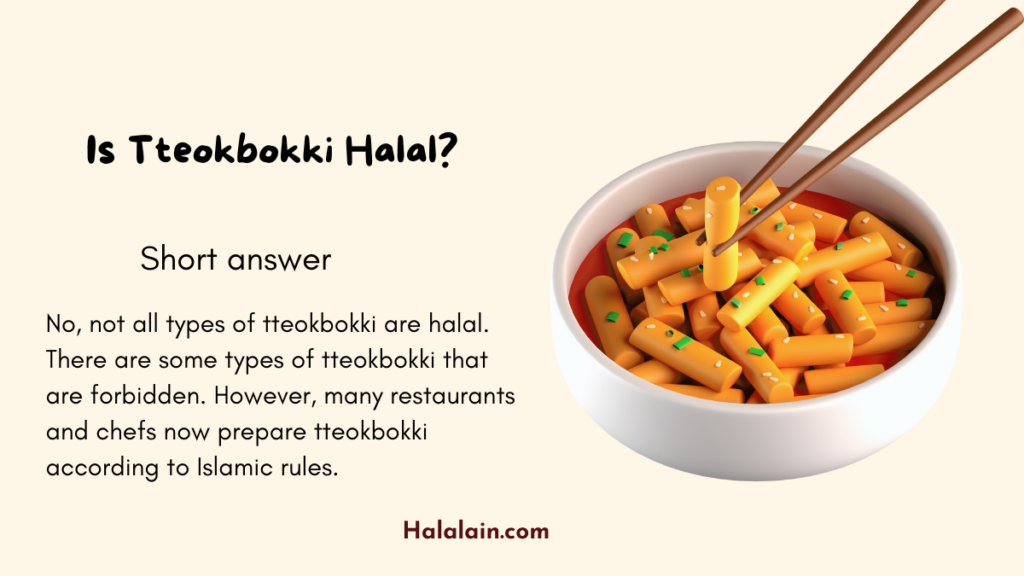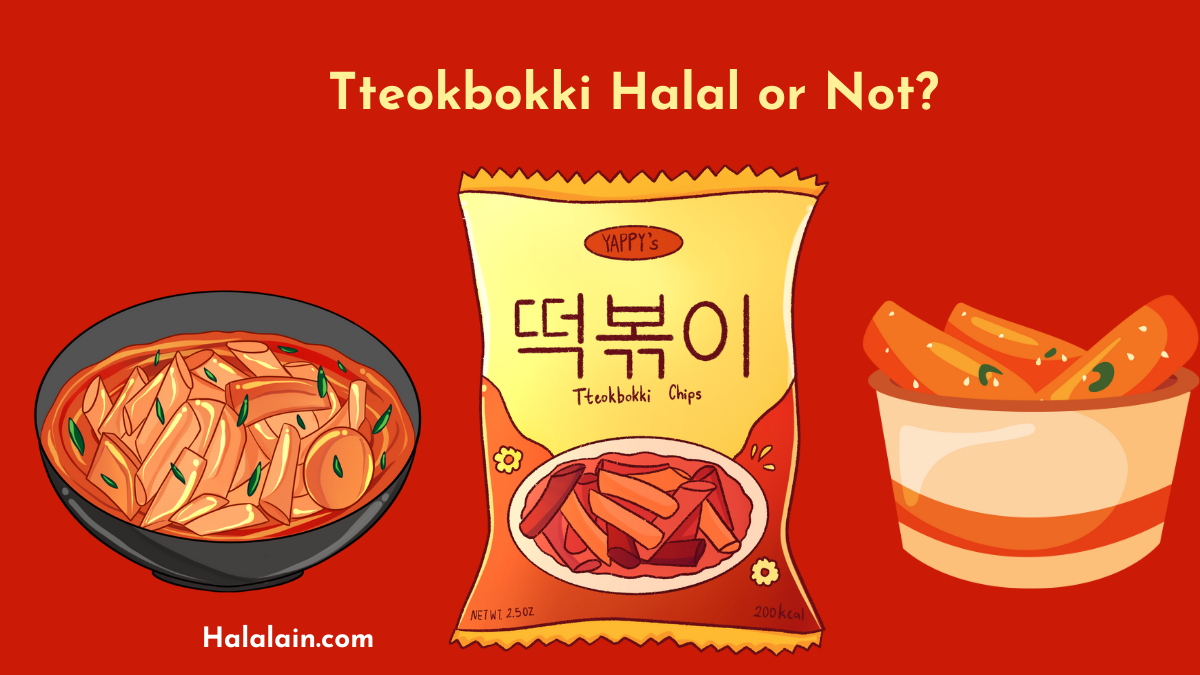Tteokbokki occupies a popular seat worldwide in this era of gourmet cuisine. This dish has gained international fame for its chewy rice cakes dipped in spicy and sweet red sauce. But it is necessary for Muslims all over the world to know: Is Tteokbokki halal? In this article, we will know whether Tteokbokki can be eaten according to Islamic dietary laws. We will discuss the ingredients, processing and other aspects of this food in detail.
What is Tteokbokki?
Tteokbokki (떡볶이) is a popular Korean dish. This dish is made with chewy, cylindrical rice cakes (tteok). His process involves cooking in a spicy gochujang (Korean chili paste) sauce. Tteokbokki is commonly known as street food. It is popular for its balance of spicy, sweet and savory flavors. Additional ingredients such as fish cakes, boiled eggs, vegetables and even meat can be added as well. Based on all these it is important to determine whether the food is halal or not.
Short answer
No, not all types of tteokbokki are halal. There are some types of tteokbokki that are forbidden. However, many restaurants and chefs now prepare tteokbokki according to Islamic rules. On the other hand if there is no use of meat and alcohol then there is no concern about its halal. Thus if you make tteokbokki at home with halal ingredients then that too is worry free.

Know More:
The main ingredients of Tteokbokki
To understand if tteokbokki is halal, it is important to first break down the main ingredients of the dish. Common ingredients include:
- Teok (rice cakes): These are made of glutinous rice flour. It is halal.
- Gochujang (chili paste): A spicy red pepper paste.
- Fish Cake: Made from processed fish with flour and seasonings.
- Soy sauce: Used to enhance the taste of food.
- Garlic, Onion and Green Onion: Commonly added for extra flavor.
These ingredients are generally not haram, but other ingredients that are added to it need to be discussed. Like meat, alcohol etc.
Tteokbokki used some Haram ingredients
Traditional teokbokki contains some ingredients that are not halal:
- Gochujang: The most concerning thing about gochujang is the alcohol used during the fermentation process. This makes the sauce haram.
- Fish Cake: Some varieties of fish cake contain haram additives such as gelatin derived from pork.
- Soy sauce: Some brands of soy sauce contain alcohol. It is used by purveyors to preserve food for a long time or to enhance flavor.
- Addition of meat or seafood: Tteokbokki uses meat in some cases. Like pork, seafood.
Halal variation of Tteokbokki
The good news is that halal varieties of Tteokbokki are available in the market. Many restaurants and chefs have acquired special knowledge and experience in preparing this recipe for the Muslim community. Here are a few variations, which make Tteokbokki halal:
- Halal Gochujang: Several halal-certified gochujang products are available in grocery stores. They are made without the use of alcohol.
- Fish Cake Substitute: You can use Halal-certified fish cake. Otherwise omit the fish cake from the item altogether.
- Halal Meat: If you want to add meat, make sure it is Halal certified. For example, when slaughtering chicken or beef, is Bismillah said? Is it slaughtered according to Islamic rules or not?
- Vegetarian Tteokbokki : You can also enjoy a completely vegetarian version of Tteokbokki by omitting any meat or haram ingredients.
Is gochujang sauce Halal?
Gochujong is a key ingredient in Tteokbokki. But not all versions of this chili paste are halal. If the fermentation process involves the use of alcohol, it will be haram. But there are halal-certified versions of gochujong. So make sure to see the Halal certification logo while purchasing Gochujong and then buy it.
How to be sure whether Tteokbokki is halal or not?
If you want to make sure your Titokboki is Halal, follow these tips:
- Check the label: Check for alcohol or pork. If there is meat, make sure it is halal slaughtered. And if there is alcohol, avoid it.
- Use Halal Substitutes: Replace haram ingredients with halal-certified alternatives. Especially in place of gochujang and soy sauce.
- Ask at restaurants: When dining out, check if the restaurant offers halal options.
- Cook at home: The best way to enjoy Tteokbokki halal is to prepare it at home using halal-certified ingredients.
Korean restaurant offers Halal Tteokbokki
As Korean food has become popular worldwide, several restaurants have started offering the halal category. You can find halal-certified Korean restaurants in countries with significant Muslim populations, such as Malaysia or Indonesia. Some Korean BBQ restaurants in major cities like Seoul, Kuala Lumpur and Dubai also offer Halal Teokboki. Always check for halal certification or ask the staff about the ingredients used so you can be sure.
Cook Halal Tteokbokki at home
Making Halal Tteokbokki at home is quite easy. Here is a basic idea:
Materials
Halal Rice Cake (tteok)
Halal-certified Gochujong
Garlic and onion
Halal Fish Cake (optional)
Soy sauce (make sure it’s halal)
Sugar, sesame oil and green onion for garnish
Instructions
When the rice cake is hard, soak it in water.
Fry garlic and onion in a pan in a little sesame oil.
Add gochujang, soy sauce and sugar to make sauce.
Stir in the rice cakes and fish cakes, cook until the sauce thickens.
Garnish with green onions and sesame seeds.
Frequently Asked Questions
Question 1: Is tteokbokki vegan?
Answer: Traditional Tteokbokki consists of fish cakes. You can make it by omitting the fish cake and using plant-based gochujang.
Question 2: Can I eat Tteokbokki in Korea if I am a Muslim?
Answer: Yes, but you have to be careful about the ingredients. Many Korean street food vendors cannot meet halal dietary laws. So it is best to ask or find halal-certified restaurants.
Question 3: What should I look for when buying Halal Gochujong?
A: Make sure the gochujang is halal-certified. Also check if any alcohol is used in the fermentation process.
Question 4: Can I add meat to Tteokbokki?
Answer: Yes, but make sure the meat is Halal-certified. Popular options include chicken or beef.

